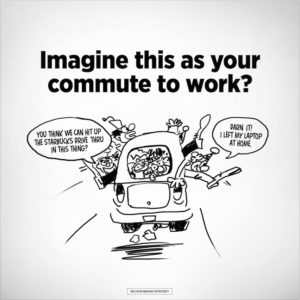The Colorado Department of Public Health and Environment began pushing forward with a plan in March that would empower unelected regulators to micromanage your commute to work. They have called it the Mandatory Employee Trip Reduction Plan, or ETRP.
Thankfully, the plan has been largely watered down. And with the public comment period for the proposal ending on August 3, Coloradans can breathe a sigh of relief — but they shouldn’t get too comfy. Regulators may yet again propose this measure. That would be disastrous for our state.
The ETRP in its original form is a mandate that would have prevented many employees from driving to work — and a program that, as with most attempts to engineer human behavior, would be costly for our state without much of a reduction in carbon emissions in return.
Regulators reasoned that there were simply too many single-occupancy commuters on the road and, to curb the vicious onslaught of Coloradans trying to get to work, strict limits must be imposed on “large employers” whose employees drive to the workplace.

Regulators did not clarify what they meant by “large.” The initial threshold was 250 employees, but officials considered opting for as few as 100. Regulators would have then forced these companies to reduce the number of their employees who commute to work — through telework, electric vehicle use, ridesharing, public transportation, biking, and walking — or else incur a daily fine.
By 2022, the plan aimed for a 10 percent reduction in employee single occupancy vehicle commuting. No more than 75 percent of employees would have been able to commute alone by 2023. By 2025, that number would have dropped to 60 percent.
There is a certain bias under which these regulators, many of whom work in traditional office spaces, seem to operate. It is relatively easy for, say, an attorney or a copywriter to telework. But the equation looks a bit different from the position of the manufacturer, the personal service provider, or the retailer, who need employees on site and can’t afford to micromanage how each and every one will commute.
Regulators also do not seem to have considered the incentives created by this plan. The mandate would have applied a hefty regulatory burden to businesses that exceed a certain employee threshold.
How would one evade the threshold? By employing fewer people — and it isn’t difficult to foresee where an incentive to retain fewer employees would lead.
![]() The employee no driving mandate would not have been much easier on individuals. Its provisions would have made it more difficult for Coloradans to take their children to and from school, purchase groceries, pick up dry cleaning, and see friends after work. Regulators have proposed “hardship waivers and exemptions” to account for these eventualities. They would reject or approve these waivers on a case-by-case basis, but Coloradans would be forced to ask for government permission to do the things that residents of every other state can do without unnecessary interference.
The employee no driving mandate would not have been much easier on individuals. Its provisions would have made it more difficult for Coloradans to take their children to and from school, purchase groceries, pick up dry cleaning, and see friends after work. Regulators have proposed “hardship waivers and exemptions” to account for these eventualities. They would reject or approve these waivers on a case-by-case basis, but Coloradans would be forced to ask for government permission to do the things that residents of every other state can do without unnecessary interference.
Colorado would pay an exorbitant price for these regulations, something we could hardly afford as we continue to recover from the COVID-19 pandemic. Many businesses would no doubt relocate to states with less burdensome regulatory environments.
The employee no driving mandate is a feel-good, do-nothing policy with a high price. It is do-nothing because Colorado represents less than 2 percent of the country’s population, meaning that the mandate wouldn’t make a dent in emissions.
Nevertheless, the costs to businesses, individuals, and personal freedom would be devastating.
Regulators should instead focus on the policies that work, such as removing barriers to innovation on new and more efficient energy and modes of transportation, in order to make alternative forms of commuting more attractive, rather than obligatory.
Luckily, this mandate was largely scrapped. It is a plan to punish residents for simply going to work — and their employers for hiring them. Surely, we are capable of crafting sensible legislation to improve our environment, while ensuring that Coloradans don’t leave our state in response to it.
In the meantime, we should remain on the lookout for similar schemes in the future.
Jesse Mallory is state director of Americans for Prosperity-Colorado.


